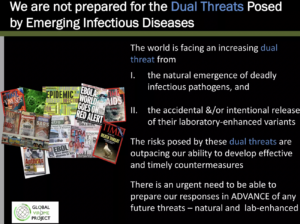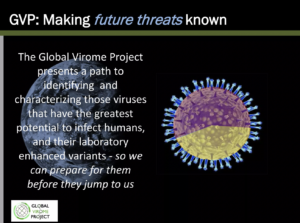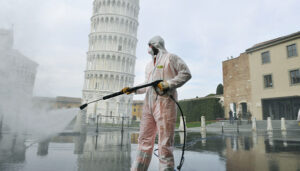Peter Daszak spent many years hunting down bat viruses with Chinese scientists, helped fund their cutting-edge research in Wuhan, and then vociferously led opposition to any suggestions that the pandemic might have been linked to a laboratory in the city. A pugnacious character, the British zoologist would pop up regularly in the media to fiercely dismiss “conspiracy theories”, playing a key role in efforts to stifle debate over the origins of Covid-19.
So how strange to discover that this same man had previously warned that risky research was “intensifying” threats from “lab-enhanced viruses”. In fact, two years before the pandemic erupted, Daszak was involved in drafting a presentation about the dangers of engineered viruses being accidentally or even deliberately released into the world.
In this newly uncovered presentation, the scientist warned that “gain-of-function” research — which boosts the transmissibility of viruses — was “elevating the risk” that “deadly novel biological agents” could be released through accident or design. The document, demanding the urgent development of counter-measures, put such risk at the same level as natural spillover from the wild. It even focused on the specific threat from coronaviruses.
Yet after the pandemic erupted in Wuhan, Daszak headed the charge against those claiming the mysterious new disease might be potentially linked to research in the city, with even the British Medical Journal branding him the leader of the campaign to label such critics as conspiracy theorists.
Little wonder the disclosure of this document has provoked angry claims of hypocrisy. Richard Ebright, an expert on biosecurity and professor of chemical biology at Rutgers University in New Jersey, told me it meant that Daszak and his allies have spent the past three years not telling the world the whole truth. The revelations, he said, underlined “the shocking recklessness” of funding gain-of-function research in Wuhan that was being carried out at a low-level biosecurity lab “with no protections beyond a pair of gloves, a lab coat and a hood”.
Today, Daszak is the $460,368-a-year president of EcoHealth Alliance, a New York-based group that channelled US research funding to Wuhan Institute of Virology until the payments were exposed and terminated by President Trump in April 2020. The former Kingston University snail researcher responded with outrage, rounding on suggestions that research in Wuhan might have sparked the pandemic. Typical was a June 2020 article in The Guardian entitled “Ignore the conspiracy theories: scientists know Covid-19 wasn’t created in a lab” that insisted claims of “frankenviruses” made in labs were “the latest chapter in a tale of blame, misinformation and finger-pointing”.

Most infamously, he was the covert organiser of a statement in The Lancet journal that condemned “conspiracy theories suggesting that Covid-19 does not have a natural origin” and absurdly praised China’s “rapid, open and transparent” sharing of data. Signed by 27 experts, the document helped to crush scientific, political and media debate on whether the new virus might have been manipulated or leaked from a laboratory. The journal was forced later to add a note clarifying Daszak’s “competing interests” and he was removed from heading up its own inquiry into the virus’ origins.
Yet the presentation for the launch of his Global Virome Project (GVP) suggested something very different: that the risks of lab leaks and gain-of-function research needed to be taken seriously. It was seeking $1.3 billion funding over 10 years to help end “the pandemic era” by identifying viruses with the “greatest potential to infect humans and their laboratory-enhanced variants so we can prepare for them before they jump to us”.
The GVP was chaired by the infectious diseases expert Dennis Carroll, another of the signatories to The Lancet statement. Daszak was the project’s director, secretary and treasurer and emails obtained through freedom of information requests demonstrate that he had helped draft the pitch document.

The 40 slides prepared for the 2017 presentation focus on “dual threats” posed by both natural emergence of diseases and the accidental or intentional release of “laboratory enhanced variants”. They warn that gain-of-function research is inflaming the danger of “illnesses and deaths” along with “mass hysteria and panic”. They propose a 10-year project to “develop countermeasures” and build a huge database of viruses to enable their “rapid detection of natural and laboratory-enhanced threats”.
This presentation reflects sensible fears held by many sensible scientists. One page discloses plans for quick identification of engineered viruses. Another underlines the need to “rapidly recognise a lab-enhanced virus”. A third highlights the evidence of Sars-like coronaviruses in Yunnan — a tropical region of southern China where bats roost and scientists from Wuhan Institute of Virology went to collect their samples — while finding no signs of such infections in Wuhan itself.
A version of the slide deck came to light in an email exchange between Daszak and his GVP colleagues, obtained in a freedom of information request from US Right to Know, a public health campaign group. The full set was found by Gilles Demaneuf, a data scientist and member of the Drastic group which challenged the science establishment’s narrative that Covid almost certainly spilled over naturally from animals.“When Daszak needed to protect his back,” says Demaneuf, “anybody who dares say exactly what he wrote in these slides was called a conspiracy theorist — or worse.”
Emails indicate that the GVP organisers also held discussions on their plans with Washington defence research agencies. Last month, FBI director Christopher Wray said his agency had “for quite some time assessed that the origins of the pandemic are most likely a potential lab incident”. It is now backed by the Department of Energy, which oversees a network of laboratories engaged in advanced biology, although other US intelligence agencies disagree with their conclusion.
After the pandemic started, the GVP stalled. Three months ago, a federal watchdog accused US funding authorities and EcoHealth Alliance of “deficiencies” in their monitoring and oversight of the work conducted on coronavirus strains at Wuhan Institute of Virology. Daszak has collaborated on extensive field research in Yunnan and 17 scientific papers since 2005 with the laboratory’s leading bat coronavirus expert Shi Zhengli.
Last month, EcoHealth Alliance boasted of winning fresh US grants to “identify” spillovers of bat coronaviruses in three other Asian nations by sampling thousands of bats and other mammals. “This will help identify the potential role of other wildlife as intermediate hosts in the transmission of bat CoVs — and may also help to shed light on the origins of SARS-CoV-2,” it claimed. The body did not respond to requests for comment on the GVP presentation.
Critics of virus hunting schemes argue that they present high risk while delivering few tangible benefits. A year-long investigation by The Washington Post concluded that such research could be placing the planet in greater danger of another pandemic, accusing the US of continuing to funnel big sums into overseas research despite insufficient oversight as regulation fails to keep pace with new technologies.There are thought to be thousands of biocontainment labs handling dangerous pathogens, although the precise number around the world is unknown.
Simon Wain-Hobson, the virologist who discovered the genetic blueprint of HIV, is among those wanting to see a ban on gain-of-function work. He told me that Daszak’s presentation exposed the “fallacious logic” of suggesting engineered viruses could help to predict pandemics or assist production of preventative drugs and vaccines. “The science fiction goes on,” he said.
Disclaimer
Some of the posts we share are controversial and we do not necessarily agree with them in the whole extend. Sometimes we agree with the content or part of it but we do not agree with the narration or language. Nevertheless we find them somehow interesting, valuable and/or informative or we share them, because we strongly believe in freedom of speech, free press and journalism. We strongly encourage you to have a critical approach to all the content, do your own research and analysis to build your own opinion.
We would be glad to have your feedback.
Source: UnHerd Read the original article here: https://unherd.com/



